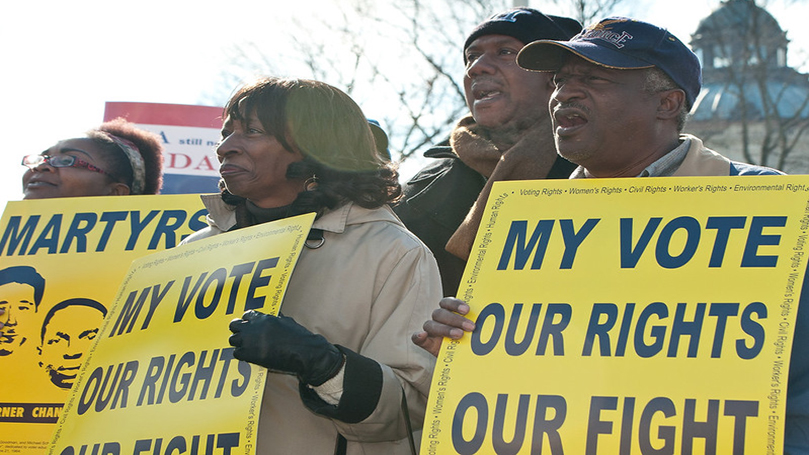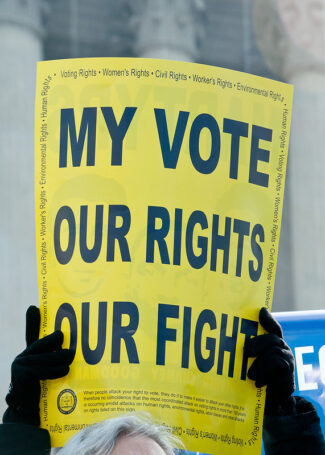
The following was presented to the National Board on Jan. 19, 2022, on behalf of the African American Equality Commission.
Today’s urgent struggle to protect and expand the anti-racist, anti-sexist, democratic voice of working people through the ballot, the struggle for voting rights, occurs within the context of the 2020 George Floyd Rebellion, and an ongoing upsurge in strikes like that at the UMW Warrior Met Coal, ExxonMobil, Special Metals, and Starbucks. Walkouts such as occurred at various unorganized McDonalds are also very significant.
This pro-democracy struggle continues that of chattel, and today penal, slaves and wage workers in the USA for recognition of their human dignity, for the power to allocate the social profits generated by their labor through democratic mass action, and for freedom.
The “Mass Poor People’s and Low-Wage Workers Assembly and Moral March on Washington” on June 18, 2022, is an opportunity for all-out mobilization in support of democratically transforming the balance of power on behalf of the poor, and to “make real policies to fully address poverty and low wealth from the bottom up.”
Every epoch of US history since the drafting of the Declaration of Independence, and later the US Constitution, has seen struggles against chattel and penal enslavement and wage exploitation, and for the dignity and well-being of workers. The Declaration reflects the tensions of the time of its drafting in its much misrepresented statement of freedom from the monarch, “We hold these truths to be self-evident, that all men are created equal,” while crafting a nation where only white male landowners of specific age had a voice in the halls of power, and a vote, and where chattel slavery was legal and protected. While much has changed, anti-democratic tendencies continue in different forms today, regardless of fake assertions that the US is the land of “freedom.”
Today white nationalist militias and . . . police conspire to terrorize and keep Black and working people from voting.
Recognizing this tension, and changing demographic realities, capitalist leaders took long-term steps to protect their control and profits, starting at least as early as the Goldwater period. They developed an effective anti-democratic group of actions and have applied them consistently. These actions include (but are not limited to) gerrymandering, voter ID requirements, poll taxes and financial impediments to participation in the democracy, not counting people in the census, incarceration, denying felons access to the voting box, purging voter rolls, and outright terror. Just as the KKK was used in the period following the upsurge of Black representation in the post–Civil War Reconstruction, so today white nationalist militias and direct state power in the form of the police conspire to terrorize and keep Black and working people from voting.
To protect their profits and control, the super-rich, capitalists, and their minions utilize every tool available for social control including the media, such as Fox News and Breitbart; capitalist culture (films, music, art); anti-union, sexist, and racist rhetoric; anti-immigrant attacks including forced family separations and deportations; and manipulating bourgeois democratic forms through national and state political parties.
Politically, the Republican Party has been the main organized electoral representation of this trend.
The Democratic Party, also under the leadership of capitalists but with significant involvement of Black people, women, and organized labor, has since the early 1960s talked about voting rights but has been ineffective in challenging the Republican onslaught, which is coming to a decisive inflection point today. In fact, the U.S. is in a decisive struggle against proto-fascist initiatives such as that seen on January 6, 2021.
Struggles for community control of the police or democratic control over healthcare through Medicare for All are linked to and extend the strikes and other struggles today, and all are dependent on access to the ballot box for final, peaceful electoral resolution.
The current balance of power, or balance of forces, is reflected in the level of “street heat,” or community organization and mobilization. The Republican Party has been putting consistent money and effort into developing community organization around cultural and policy issues like anti-abortion and women’s health, anti–critical race theory, or pro-gun issues. The Democratic Party has not been able to overcome its internal conflicts and do the same consistently around pro-labor, anti-racist, or anti-fascist and other pro-democracy people’s issues.
Street heat from sections of the democratic movement has been at best uneven. At the local and state level some are quite active: the Georgia response to Biden’s recent visit is but one demonstration. However, it has not been broad enough, consistent enough, or large enough in terms of the number of people involved.
Why do sections of the organized working class keep looking to capitalist leaders for permission to move forward?
While one can legitimately ask why Biden felt he had to keep quiet on a fundamental struggle like that around voting rights, or how multiple Democratic presidents could ignore 40 years of consistent efforts by Republicans to limit Black and worker access to the voting booth, the larger question before us is, why do sections of the organized working class keep looking to capitalist leaders for permission to move forward on key struggles rather than being confident in the working class and organizing, allowing the electoral leadership to catch up to the people, when the balance of forces dictates that this should occur.
Even when in technical control of both houses of Congress, Democrats keep looking to the Right for “victories,” thinking this strategy will facilitate governing. Instead, it plays into the Republican strategy of “take no prisoners” and results in little getting done that is not approved by the Republicans or the class which leads that party. Just as President Obama found his pro-worker initiatives watered down or negated, and he could not appoint a Supreme Court justice, so Biden is experiencing the same, with opportunist “Democrats” like Senators Joe Manchin (D-W. Va.) and Krysten Sinema (D-Ariz.) undermining efforts to respond to the mass of people’s demands for change and democratic expansion.
 What is at stake today is the ability of the great mass of U.S. peoples to have a voice in building this pluralistic society. The Freedom to Vote Act and the John Lewis Voting Rights Advancement Act address technical issues but also have the impact of facilitating mail-in voting and providing federal oversight to limit state’s actions to deny workers, and in particular Black workers, access to the ballot.
What is at stake today is the ability of the great mass of U.S. peoples to have a voice in building this pluralistic society. The Freedom to Vote Act and the John Lewis Voting Rights Advancement Act address technical issues but also have the impact of facilitating mail-in voting and providing federal oversight to limit state’s actions to deny workers, and in particular Black workers, access to the ballot.
Today, we are at a point where the slow accretion of anti-democratic actions over a long time, the quantitative mass of efforts to undermine democratic participation, has morphed into a qualitative struggle for the very heart of bourgeois democracy and against fascism. This is a long struggle that has been brewing for many decades. It requires the organization of tens of millions of Black and brown people, workers, small business people, farmers, the unemployed, city and rural people, women, men, and youth, all finding ways to say, “we support each other, we are united in our struggle to live with dignity, to make a living wage, and to have an effective — in fact decisive — voice in the direction that our society develops, and the policies and programs enacted.”
This must include an anti-imperialist, anti-militarist component, an anti-racist component, an anti-sexist component, protection for the environment, and solidarity with all worker and farmer struggles everywhere. The struggle must be multi-pronged, including electoral struggles at all levels (local, state, and federal), but primarily focus on effecting a change in the balance of power by organizing in the worker and farmer communities for effective and inclusive democracy.
Images: top, SEIU (CC BY-NC-SA 2.0); My vote, our rights, SEIU (CC BY-NC-SA 2.0).


 Join Now
Join Now